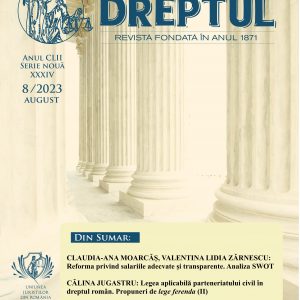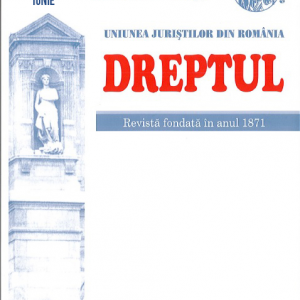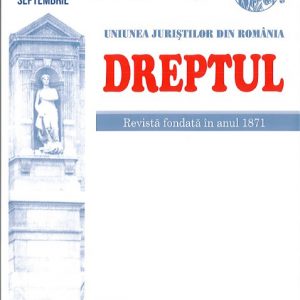-

-
 The Civil Procedure Code reserves only five articles to the court costs and this study will emphasize the fact that this area exceeds the regulatory scope of the Civil Procedure Code, having connections also with other normative acts, as well as the circumstance that the assessment of the quantum of court costs is an aspect left to the enlightenment and wisdom of the judge, the legislator offering few criteria for evaluating their extent. The purpose of the present study is to provide an overview of the judicial costs, as well as to delimit the scope of the costs that can be recovered as a result of winning the trial from the costs that the courts did not approve. We will submit to the analysis the notion of costs, their legal nature, but also the legal basis underlying their award. Likewise, we will stop on the modality in which the court costs can be reduced or even rejected by the court. A separate part of the present paper will be devoted to the analysis of the lawyer’s fee, as part of the court costs. In this section, we will make a presentation of the different ways of establishing the lawyer’s fee, stopping, in particular, at the success fee, which we will define and delimit from the pact of de quota litis. At the end of the paper, we will offer some proposals de lege ferenda regarding the evaluation of the court costs, the necessity of legal regulation of the success fee and of the costs requested separately.
The Civil Procedure Code reserves only five articles to the court costs and this study will emphasize the fact that this area exceeds the regulatory scope of the Civil Procedure Code, having connections also with other normative acts, as well as the circumstance that the assessment of the quantum of court costs is an aspect left to the enlightenment and wisdom of the judge, the legislator offering few criteria for evaluating their extent. The purpose of the present study is to provide an overview of the judicial costs, as well as to delimit the scope of the costs that can be recovered as a result of winning the trial from the costs that the courts did not approve. We will submit to the analysis the notion of costs, their legal nature, but also the legal basis underlying their award. Likewise, we will stop on the modality in which the court costs can be reduced or even rejected by the court. A separate part of the present paper will be devoted to the analysis of the lawyer’s fee, as part of the court costs. In this section, we will make a presentation of the different ways of establishing the lawyer’s fee, stopping, in particular, at the success fee, which we will define and delimit from the pact of de quota litis. At the end of the paper, we will offer some proposals de lege ferenda regarding the evaluation of the court costs, the necessity of legal regulation of the success fee and of the costs requested separately. -
 Reținerea unei împrejurări ca circumstanță atenuantă judiciară: a) este posibilă doar dacă ea reduce într-o asemenea măsură gravitatea infracțiunii sau descrie atât de favorabil persoana infractorului, încât numai o diminuare a limitelor speciale este aptă să creeze un echilibru între rolurile aflictiv și educativ atașate pedepsei și să realizeze prevenția specială inerentă acesteia; b) atrage îndeplinirea de către instanță a obligațiilor de a indica împrejurarea care constituie circumstanță atenuantă, de a face referire la mijloacele de probă din care ea rezultă și de a o încadra în ipotezele prevăzute de lege.
Reținerea unei împrejurări ca circumstanță atenuantă judiciară: a) este posibilă doar dacă ea reduce într-o asemenea măsură gravitatea infracțiunii sau descrie atât de favorabil persoana infractorului, încât numai o diminuare a limitelor speciale este aptă să creeze un echilibru între rolurile aflictiv și educativ atașate pedepsei și să realizeze prevenția specială inerentă acesteia; b) atrage îndeplinirea de către instanță a obligațiilor de a indica împrejurarea care constituie circumstanță atenuantă, de a face referire la mijloacele de probă din care ea rezultă și de a o încadra în ipotezele prevăzute de lege. -

-

-
 The legislator regulates the “Summoning and service of the procedural documents” in Articles 153-173 of Title IV of IInd Book of the Code of Civil Procedure, texts which largely take over the provisions of the 1865 Code concerning this procedure and, at the same time, establish some new solutions aimed at streamlining the procedure at issue and to adapt it to the new realities. In this study, the foregoing are examined in detail.
The legislator regulates the “Summoning and service of the procedural documents” in Articles 153-173 of Title IV of IInd Book of the Code of Civil Procedure, texts which largely take over the provisions of the 1865 Code concerning this procedure and, at the same time, establish some new solutions aimed at streamlining the procedure at issue and to adapt it to the new realities. In this study, the foregoing are examined in detail. -
 On number of occasions, the Constitutional Court is in the position to determine whether a norm is constitutional or not, referring to the provisions of Article 1 (5) of the Constitution, republished version. In order to comply with the provisions of this article, it is necessary for the law, the obedience of which is required by the very first article of the Basic Law, to be clear, precise and predictable. There are numerous decisions of the Constitutional Court which state that the law is devoid of „quality”, i.e. the law is not clear, precise and predictable. The non-compliance of these requirements results in a violation of the provisions of Article 6 (1) of the Law No 24/2000 on normative technical norms for the drafting of normative acts, republished, subsequently amended and supplemented, according to which the draft of the normative act must establish necessary, sufficient and possible rules leading to the greatest legal stability and efficiency. Thus, whenever the legislator uses notions whose legal nature is uncertain or do not integrate from the conceptual point of view into the normative system, or when the legislator resorts to the use of innovative concepts in the normative acts and does not define them in their very content, the Constitutional Court will have all the reasons to establish that the provisions of Article 1 (5) of the Constitution are violated, the text being inadequately drafted.
On number of occasions, the Constitutional Court is in the position to determine whether a norm is constitutional or not, referring to the provisions of Article 1 (5) of the Constitution, republished version. In order to comply with the provisions of this article, it is necessary for the law, the obedience of which is required by the very first article of the Basic Law, to be clear, precise and predictable. There are numerous decisions of the Constitutional Court which state that the law is devoid of „quality”, i.e. the law is not clear, precise and predictable. The non-compliance of these requirements results in a violation of the provisions of Article 6 (1) of the Law No 24/2000 on normative technical norms for the drafting of normative acts, republished, subsequently amended and supplemented, according to which the draft of the normative act must establish necessary, sufficient and possible rules leading to the greatest legal stability and efficiency. Thus, whenever the legislator uses notions whose legal nature is uncertain or do not integrate from the conceptual point of view into the normative system, or when the legislator resorts to the use of innovative concepts in the normative acts and does not define them in their very content, the Constitutional Court will have all the reasons to establish that the provisions of Article 1 (5) of the Constitution are violated, the text being inadequately drafted. -

-
 This paper is a plea for adopting the legal conception on the notion of result of the offence. It points out both the shortcomings of the formal conception, which dominates the current theory on the result of the offence, as well as the shortcomings of the old naturalistic conception, which is still preserved today, being supported by the highly questionable theory of the civil tort liability.
This paper is a plea for adopting the legal conception on the notion of result of the offence. It points out both the shortcomings of the formal conception, which dominates the current theory on the result of the offence, as well as the shortcomings of the old naturalistic conception, which is still preserved today, being supported by the highly questionable theory of the civil tort liability. -
 Prin cererea de chemare în judecată, reclamantul a solicitat obligarea pârâtului la plata unor sume de bani cu titlu de daune-interese pentru neexecutarea unor obligații contractuale, acțiunea fiind înregistrată la Judecătoria Sectorului 3 București, instanța de la sediul reclamantului. În motivarea cererii principale s-a arătat că între părți s-a încheiat un contract de transport sub forma unei comenzi de transport și a anexei aferente. Pârâtul s-a obligat astfel să transporte marfa dintr-un anumit loc în altul, la o anumită temperatură. Întrucât acesta din urmă nu s-a prezentat la locul de destinație la ora stabilită în comanda de transport, destinatarul final nu a mai dorit marfa. Mai mult, cu ocazia recepției mărfii, s-a constatat că marfa fusese transportată în condiții necorespunzătoare, la o temperatură neconformă, mențiunea fiind înscrisă în CMR. În continuare, reclamantul a susținut că proprietarul mărfii, terț față de contractul de transport, ar fi suferit un prejudiciu din faptul că marfa nu a fost vândută cumpărătorului inițial, ci unui alt cumpărător la un preț inferior, rezultând o pagubă constând în diferența de preț dintre cele două vânzări. Acest prejudiciu a fost facturat de către terț reclamantului, care mai departe l-a refacturat către pârât. Prin întâmpinare, pârâtul a invocat, printre altele, excepția necompetenței teritoriale a Judecătoriei Sectorului 3 București, afirmând că nici comanda de transport, nici anexa ei nu au fost semnate și ștampilate, astfel că nu există un contract de transport. În replică, reclamantul a arătat că instanța judecătorească pe care a învestit-o cu soluționarea acțiunii este competentă, întrucât în cuprinsul anexei la comanda de transport se regăsește o clauză atributivă de competență, care stabilește competența de soluționare a litigiilor în favoarea instanțelor de la sediul reclamantului. Mai mult, susține că inexistența unui contract de transport nu poate fi reținută, dat fiind că, subsecvent comenzii de transport, au fost emise de către pârât un CMR semnat și ștampilat, o factură pentru transportul realizat în care se specifică „comanda nr. 77”, precum și o somație comunicată reclamantului prin care i s-a pus în vedere să achite prețul transportului. (Rezumat al susținerilor părților)
Prin cererea de chemare în judecată, reclamantul a solicitat obligarea pârâtului la plata unor sume de bani cu titlu de daune-interese pentru neexecutarea unor obligații contractuale, acțiunea fiind înregistrată la Judecătoria Sectorului 3 București, instanța de la sediul reclamantului. În motivarea cererii principale s-a arătat că între părți s-a încheiat un contract de transport sub forma unei comenzi de transport și a anexei aferente. Pârâtul s-a obligat astfel să transporte marfa dintr-un anumit loc în altul, la o anumită temperatură. Întrucât acesta din urmă nu s-a prezentat la locul de destinație la ora stabilită în comanda de transport, destinatarul final nu a mai dorit marfa. Mai mult, cu ocazia recepției mărfii, s-a constatat că marfa fusese transportată în condiții necorespunzătoare, la o temperatură neconformă, mențiunea fiind înscrisă în CMR. În continuare, reclamantul a susținut că proprietarul mărfii, terț față de contractul de transport, ar fi suferit un prejudiciu din faptul că marfa nu a fost vândută cumpărătorului inițial, ci unui alt cumpărător la un preț inferior, rezultând o pagubă constând în diferența de preț dintre cele două vânzări. Acest prejudiciu a fost facturat de către terț reclamantului, care mai departe l-a refacturat către pârât. Prin întâmpinare, pârâtul a invocat, printre altele, excepția necompetenței teritoriale a Judecătoriei Sectorului 3 București, afirmând că nici comanda de transport, nici anexa ei nu au fost semnate și ștampilate, astfel că nu există un contract de transport. În replică, reclamantul a arătat că instanța judecătorească pe care a învestit-o cu soluționarea acțiunii este competentă, întrucât în cuprinsul anexei la comanda de transport se regăsește o clauză atributivă de competență, care stabilește competența de soluționare a litigiilor în favoarea instanțelor de la sediul reclamantului. Mai mult, susține că inexistența unui contract de transport nu poate fi reținută, dat fiind că, subsecvent comenzii de transport, au fost emise de către pârât un CMR semnat și ștampilat, o factură pentru transportul realizat în care se specifică „comanda nr. 77”, precum și o somație comunicată reclamantului prin care i s-a pus în vedere să achite prețul transportului. (Rezumat al susținerilor părților) -
 New regulatory agency contract and the new regulatory liability, both contained in the new Civil Code, has some innovative features, such as to update the rules of private according to the needs of contemporary society. Legal provisions are yet perfectly, returning doctrine designed to further research in this area. Quality and consistency can be confirmed by jurisprudence equitable solution, thoroughly motivated, able to offer real victims a chance to repair the damage by restoring the previous situation.
New regulatory agency contract and the new regulatory liability, both contained in the new Civil Code, has some innovative features, such as to update the rules of private according to the needs of contemporary society. Legal provisions are yet perfectly, returning doctrine designed to further research in this area. Quality and consistency can be confirmed by jurisprudence equitable solution, thoroughly motivated, able to offer real victims a chance to repair the damage by restoring the previous situation. -
 In this study, the author examines the possibility of including in Romania, in the private law contracts (civil or commercial), some hardship clauses, (the hard ship clause in the Anglo-Saxon law and in the foreign trade law), even if there is no explicit regulation in this respect in current Romanian positive law (there is an explicit regulation only in the new Romanian civil code – art. 1271 – , but this Code has not become effective yet and, at present, nobody knows when it will become effective). Further on, after defining the notion of “hardship clause”, the author, also taking into consideration the Romanian legal doctrine in the matter, examines the field of application, as well as the conditions of the hardship clause.
In this study, the author examines the possibility of including in Romania, in the private law contracts (civil or commercial), some hardship clauses, (the hard ship clause in the Anglo-Saxon law and in the foreign trade law), even if there is no explicit regulation in this respect in current Romanian positive law (there is an explicit regulation only in the new Romanian civil code – art. 1271 – , but this Code has not become effective yet and, at present, nobody knows when it will become effective). Further on, after defining the notion of “hardship clause”, the author, also taking into consideration the Romanian legal doctrine in the matter, examines the field of application, as well as the conditions of the hardship clause.
